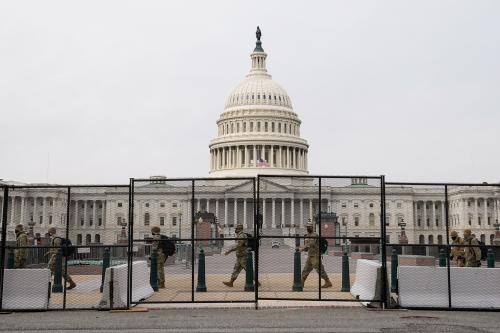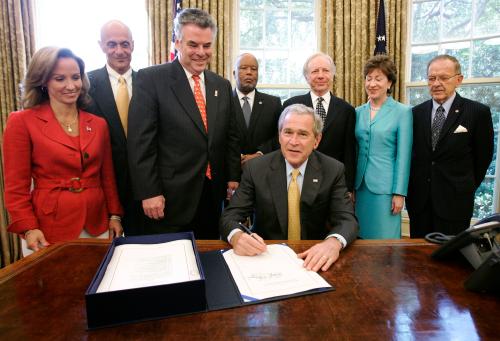“Mr. President, the only way you are ever going to get this is to make a speech and scare the hell out of the country.”
So said Sen. Arthur Vandenberg to President Harry Truman in 1947. Vandenberg, a Republican, was giving Truman advice on how to get Congress to vote for aid to help Turkey and Greece in their fight against communist insurgents. But Vandenberg might as well have been laying out rule number one in the Politics of the Cold War. From 1947 until the fall of the Soviet Union in 1991, the country was scared as hell about Soviet power and the threat of nuclear war. And these fears dominated political life.
If Vandenberg’s words have a familiar ring these days, it’s because the new Politics of Terrorism bear remarkable similarities to the old Politics of the Cold War. Fear has once again become a powerful tool and motivator.
Consider President Bush’s speech to religious broadcasters last February as he built the case for war against Iraq. “Chemical agents, lethal viruses and shadowy terrorist networks are not easily contained,” he declared. “Secretly, without fingerprints, Saddam Hussein could provide one of his hidden weapons to terrorists or help them develop their own. Saddam Hussein is a threat. He’s a threat to the United States of America.”
Bush scared the hell out of the country, and we followed him to Iraq. Vandenberg might have approved.
The new Politics of Terrorism have immensely strengthened the political standing of George W. Bush. The basic facts are well known. Immediately before 9/11, Bush’s approval ratings were falling. In his memoir, “The Right Man,” former Bush speechwriter David Frum admitted that he was planning to leave the White House before 9/11 because he did not want to watch as the Bush presidency “unraveled.” After 9/11, Bush’s approval soared. Frum would argue that this was a tribute to Bush’s handling of the attacks. It was also a tribute to the nation’s deep desire to unite behind its president. The country, said Mark Penn, a Democratic pollster, had declared: “This is America, we hold together in the face of such a tragedy.”
For months, criticism of Bush was put on hold as Democrats scrambled to prove how cooperative and patriotic they were. But if it was unpatriotic to criticize Bush in the months after 9/11, when would criticism become patriotic again, especially since the war on terrorism would be a long, twilight struggle? Shrewdly — if, in the eyes of their opponents, manipulatively — Republicans became experts at the political version of Whack-a-Mole. Any time Democrats poked up their heads to challenge the president, especially on terrorism, they were beaten down for a lack of patriotism.
Leading Democrats — particularly Sen. Tom Daschle, Rep. Richard Gephardt, Sen. John Kerry — all received this treatment. Typical was House Speaker Dennis Hastert’s comment about Daschle’s criticism of Bush’s diplomacy before the Iraq war. Daschle, he said, had “come mighty close” to “giv[ing] comfort to our adversaries.” That is Cold War talk — as is guilt by association, this time with the French.
The Cold War metaphor also applies to intellectuals and activists on the left. Because the terrorism threat is real, as the Soviet threat was, even Bush’s staunchest opponents have taken it seriously. Many on the left supported the war in Afghanistan and defended Bush’s use of words such as “totalitarian” to define the terrorist enemy. Much of the left also rallied to the American cause at the start of the Cold War.
But the united front against terrorism has been even stronger than the unity mustered back then. In the Cold War years, some on the left — a minority that shrank as time went on — still insisted that the Soviet Union was a “progressive” force. There was no way to argue that the Taliban or Osama bin Laden’s marriage of medievalism and fascism were in the least bit “progressive.” A “Liberals for the Taliban” organization is as improbable as a group called “Conservatives for Permissiveness and Socialism.”
Obsession with secrecy is another trait the war on terrorism and the Cold War share. Many of the great controversies of the early Cold War era — the spying convictions of the Rosenbergs and Alger Hiss — were about the disclosure of secrets to the communist enemy. The new politics of terrorism reinforces the Bush administration’s penchant to keep secret as much as possible — witness Vice President Cheney’s refusal to disclose information from his energy task force. For months, the administration postponed a serious inquiry on the intelligence failures preceding 9/11 on the grounds that it might inform terrorists of our weak points.
The new politics of terrorism also revive the issues that have naturally favored Republicans. For three consecutive presidential elections beginning in 1980, foreign policy toughness was a central pillar of Republican strategy, causing defections to the GOP among neoconservative intellectuals and working class New Dealers alike.
The importance of the Cold War to Republicans was underscored by the differences between the last election of the Cold War, in 1988, and the first post-Cold War election in 1992. In both elections, George H.W. Bush was the GOP nominee. In both elections, he won large majorities among voters who listed foreign policy as a primary concern. The big difference? By the time Bush was running for reelection, foreign policy had receded as a central issue for most voters, despite the military victory that Bush had orchestrated in Kuwait. In 1992, most of the country voted on economics and other domestic issues. The Republicans were routed. George Will, the conservative columnist, captured the elder Bush’s problem perfectly: “George Bush prepared all his life to conduct the Cold War, only to have it end, leaving him (almost literally) speechless.”
This President Bush is not speechless when it comes to the new dynamic created by terrorism, as he showed in the 2002 midterm elections. Bush turned public anxiety into Republican votes by arguing that the then-Democratic Senate was “not interested in the security of the American people.”
A national threat serves Bush in another way: When voters look for security, especially from foreign enemies, they look to the executive branch of government. Franklin D. Roosevelt understood this in 1940 as war raged across Europe. His slogan then was, “Don’t change horses in midstream.” In 1940, the horse was a Democrat; now, the horse is a Republican.
There is one important difference between Roosevelt’s approach and Bush’s. FDR saw fear as something that could paralyze a nation and prevent action. Bush (like Harry Truman and Vandenberg before him) sees fear as moving the nation to action. Each new terrorist alert reminds the nation of the dangers it faces. Each terrorist action pushes other issues to the background, which in a sluggish economy can only help Bush. A cynic might say that the only thing Republicans have to fear is the end of fear itself. Whatever doubts Americans have about Bush’s handling of the economy, polls show they see him as a strong and steadfast leader when it comes to facing down foreign foes.
And since the war on terrorism, like the Cold War, will be long, shadowy and difficult, there is no telling when it will be declared over. The toppling of those Saddam statues was not like the fall of the Berlin Wall. After Saddam, there are many enemies to slay, many terror cells to break up.
An open-ended, low-level campaign serves Bush’s political interests far better than a shorter but all-consuming conflict. World War II, for example, demanded the total mobilization of American resources and sacrifices from all sectors of society. The sacrifices in the war on terrorism are asked mostly of members of the military, police and firefighters, and few others. Because this war is a sometime thing, Bush can give patriotic speeches on even days and tax-cutting speeches on odd ones. The fiscal package Congress adopted last week suggests that the war on terrorism can, indeed, coexist with tax cuts without end.
This could help Bush avoid the fate of Winston Churchill. The British prime minister was bounced from office in 1945 — despite his brilliant leadership — by an electorate whose wartime sacrifice and solidarity made them ready to embrace the Labor Party’s program of social reform. Sorry, Democrats, 2004 doesn’t look like 1945.
So when does this stop? One Democratic pollster argues that the mystery for his party is whether there is a “tipping point.” If, God forbid, there are more terrorist attacks — especially if they happen in the United States — does Bush gain additional strength, or do Americans begin to question his leadership?
For Democrats such as Sen. Joseph Lieberman, the answer is straightforward: The party should be as tough as Bush, neutralize the foreign policy and terrorism issues, and win on domestic concerns. This certainly worked for the Democrats before. In 1960, John F. Kennedy Jr. was at least as much of a Cold Warrior as Richard M. Nixon was. Kennedy even argued that the Eisenhower administration had let American defenses go soft and allowed a “missile gap” to grow.
Putting aside that the missile gap was largely invented, Democrats are now looking for its equivalent. Rep. David Obey and Sens. John Edwards and Bob Graham have argued that Bush’s budget cuts and the fiscal crises in the states and localities are forcing cutbacks in the very resources — police, firefighters, rescue workers — that need to be strengthened to fight terror.
Graham says that the war on Iraq undermined the war on terrorism by shifting attention away from al Qaeda, and he reiterated this point after the recent attacks in Saudi Arabia. Kerry floated his own get-tougher message in a letter last week urging Bush to subject Saudi Arabia to the money-laundering provisions of the Patriot Act. Kerry also tried to enlist public support for a new patriotism that insists on both rights and responsibilities. Being responsible, the Massachusetts senator said, included being tough on corporate greed and tax cuts for the wealthy.
Will any of this work? David Winston, a Republican pollster, argues that Democrats are in a box. In 2002, he says, they failed to speak strongly and clearly about terrorism. But if they now attack Bush’s handling of terrorism, they risk looking “partisan,” a charge from which Bush, so far, seems immune. In Winston’s analysis, the new politics of terror may mean that Democrats are damned if they do, and damned if they don’t.
Salvation could come if a worsening economy reduced terrorism’s political salience. If Iraq becomes a nasty quagmire, Bush will be held responsible. Already last week, Democratic senators and even some Republicans blasted the administration for lacking a plan to deal with postwar Iraq. Democrats who were divided on the war itself are largely united on the need to internationalize the rebuilding effort. People may even ask where Iraq’s weapons went. Politics were not static during the Cold War and will not become static now.
But let there be no doubt: Terrorism has transformed American politics and has given Bush advantages he never anticipated. And he has shown that he’ll make good use of every single one of them.



Commentary
Op-edInevitably, The Politics Of Terror: Fear Has Become Part Of Washington’s Power Struggle
May 25, 2003